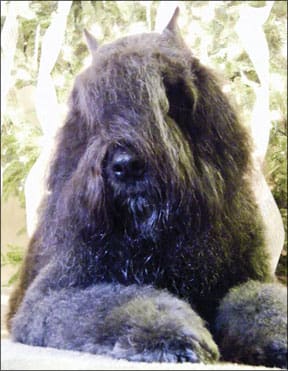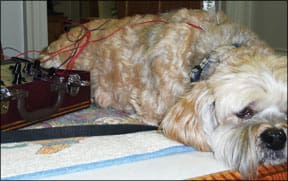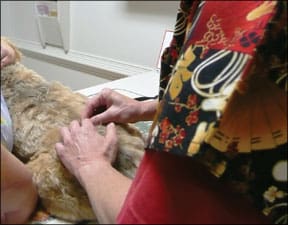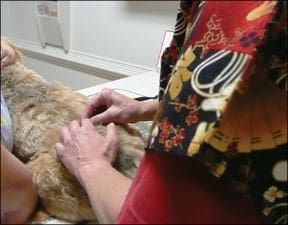Nine-year-old Armond, a handsome Bouvier, had his right hind leg amputated after his veterinarian discovered osteosarcoma. His guardian, Fanna Easter, then enrolled him in a rigorous chemotherapy regimen designed to knock the cancer out of his system. Seven days after his first treatment, Armond was still reluctant to eat, and had lost close to two pounds. Easter tried everything, from home-cooked beef and pork, to McDonald’s, Arby’s, liverwurst, potted meat, sardines, four types of canned dog food, and more. The most Armond ate at any one time was two bites.

Two different veterinarians recommended that Easter add acupuncture to Armond’s treatment regimen for help with his discomfort and lack of appetite. Easter is a self-proclaimed “huge skeptic,” but, desperate to do something to help her dog, she made an appointment for acupuncture with her veterinarian. Easter recalls sitting on the floor of the clinic with Armond as the veterinarian explained which acupuncture points she would focus on to treat Armond, including the nose area for nausea:
The vet placed the needle on his nose leather first, inserted the rest of the needles, and left the room. She immediately came back in with a bowl that contained canned dog food, which she presented to Armond. He turned his nose away, which did not surprise me. Calmly, she removed the food, waited for a count of three, showed it to him again, and he wolfed it down. This all transpired about 20 seconds after she’d inserted the needles. I thought, “This is not happening!”
Still the skeptic, I declared to the vet that it was a fluke. So she left the room and came back with another bowl containing another can full of food. He promptly, without any hesitation, wolfed it down. And I just cried!
Is it for real?
Randomized clinical trials in humans have shown that acupuncture is effective for dealing with chemotherapy-induced nausea and vomiting, as well as post-operative pain, cancer-related pain, chemotherapy-induced leucopenia (excessive reduction in white blood cells), fatigue, xerostomia (unusual dryness of the mouth), and possibly insomnia, anxiety, and quality of life.
Further, esteemed U.S. cancer centers such as the Dana-Farber Cancer Institute (DFC) in Boston, Memorial Sloan-Kettering Cancer Center in New York, and M.D. Anderson Cancer Center in Houston have begun to integrate acupuncture into their treatment plans.
The National Cancer Institute notes that the oldest medical book known, written in China 4,000 years ago, mentions acupuncture being used to treat medical problems. In the United States, acupuncture has been used for about 200 years, although research on acupuncture did not begin in the U.S. until 1976. And it was in 1996 that the U.S. Food and Drug Administration (FDA) approved the acupuncture needle as a medical device.
Susan Wynn, DVM, CVA, of Georgia Veterinary Specialists in Atlanta, has been using acupuncture with her cancer clients for 11 years. She notes that we’ve not yet seen studies conducted using dogs as subjects that are similar to the studies that have shown the positive results in humans. However, she adds, Anecdotal evidence mirrors what has been shown in people. The species are similar enough, and there are enough historical data that we feel confident using some human studies as guides to what we do. In the long run, she believes that we will need to see studies in dogs, simply to lend validity and credibility to the technique.
How it works
In a paper, “The Value of Acupuncture in Cancer Care,” published in 2008 in Hematology/Oncology Clinics of North America, the authors state that. . . studies of acupuncture in animal models and humans suggest that the effect of acupuncture is primarily based on stimulation to and the responses of the neuroendocrine system involving the central and peripheral nervous systems.

Dr. Wynn comments that, “In general, we see the systemic release of chemical mediators such as endorphins and serotonin.” In layman’s terms, those are the “feel good” chemicals of the body. Acupuncture is often used as a complementary method along with usual care to provide additional pain reduction and can, in fact, lessen the need for prescription painkillers.
The National Cancer Institute’s website says that, “Acupuncture may cause physical responses in nerve cells, the pituitary gland, and parts of the brain. These responses can cause the body to release proteins, hormones, and brain chemicals that control a number of body functions. It is proposed that, by these actions, acupuncture affects blood pressure and body temperature, boosts immune system activity, and causes the body’s natural painkillers, such as endorphins, to be released.”
Traditional Chinese Medicine (TCM) guides the clinical practice of acupuncture in the U.S. During acupuncture, certain physical “points” or locations on the body are tonified (stimulated) or sedated (suppressed). Some points are indicated for common symptoms, but the patient’s overall symptom pattern or “picture” is also taken into account by the practitioner.
Diane Castle, DVM, CVA, of the Union Hill Animal Hospital in Canton, Georgia, has been using acupuncture in her clinic since 2001. She explains, Points are chosen based on the pattern the patient presents with. Patients with the same type of cancer may present with different patterns and therefore be treated with different points.
When to use acupuncture
Dr. Wynn uses acupuncture in her cancer patients to target nausea, neutropenia/immunosuppression, and fatigue. She recommends it primarily for addressing side effects of chemotherapy and/or radiation treatments, but also uses acupuncture to alleviate cancer pain and for hospice situations.
Dr. Castle has seen acupuncture help in cases of anorexia, nausea, vomiting, diarrhea, constipation, oral ulcers secondary to chemo, bleeding, pain, and weight loss.
Dr. Castle and Dr. Wynn agree that there is not a typical protocol to follow, and both frequently use a combination of acupuncture, herbs, and diet to support cancer patients. Dr. Wynn has seen programs range from a single treatment, up to regular treatments for the life of the animal. Dr. Castle points out that, Treatment intervals will vary with the pet and how they respond to treatment, how often the owner is able to get them in for treatment, and whether or not we have to work with a chemotherapy schedule.
Karissa Carpenter’s white German Shepherd, Baby, was diagnosed with lymphoma at age 11. Two months after her diagnosis, Baby’s family added acupuncture to her treatment plan, taking her in for acupuncture anywhere from every week, to every three weeks, depending how the dog was feeling. We would get there for our appointment, and Baby would take a nap while she was being treated, says Carpenter. She would just be so much more comfortable, and her old age creakiness seemed to be alleviated by acupuncture. We continued taking her in for acupuncture right up until she died. We even had an appointment scheduled for that last week.
Dr. Castle, Baby’s veterinarian, adds that in addition to helping Baby feel more comfortable, she used acupuncture to treat vomiting that occurred during chemo. At one point, the internist administering the chemotherapy took Baby off Metacam (a non-steroidal anti-inflammatory); since she was unable to stay on the medication for arthritis, acupuncture was the major treatment for keeping her comfortable. Baby lived for close to two more years after her cancer diagnosis.
Quality of life
It is possible that a dog will not respond to acupuncture. Dr. Wynn has seen this in some dogs who have had severe reactions to chemo and who do not respond to acupuncture alone; they need critical care support and time.
Dr. Castle concurs, but adds, “Of course there are some who don’t respond, but I feel I can generally improve the quality of life for the pet even if the time left is short.”
Both vets emphasize the importance of preserving or improving the patient’s quality of life and have seen many clients turn to acupuncture when no other options were furthering that goal. Dr. Castle relates the story of a 12-year-old Corgi who was diagnosed with hemangiosarcoma of the spleen and heart. The internist gave the dog two to four weeks to live if the dog did not have surgery to remove the spleen. The owners elected not to put him through the surgery, but a combination of Chinese herbs and acupuncture gave him and his family several happy months together.
In humans, a study involving 40 ambulatory patients with advanced ovarian or breast cancer who received conventional palliative care (treatment of symptoms) also received acupuncture for 8 weeks (12 sessions). A significant decrease in symptom severity was seen for fatigue, pain, and insomnia. Quality of life measures showed higher positive scores during acupuncture treatment than before treatment and were sustained for 12 weeks relative to baseline.

Who’s a candidate?
Really any canine cancer patient can benefit; the only contraindication is using needles near a tumor. This makes having a confirmed cancer diagnosis critical. Dr. Wynn explains, I sometimes hesitate to do acupuncture on a patient for symptomatic therapy; if I suspect a tumor, I’m not comfortable until I know what’s there.
That brings up two points: using a veterinary acupuncturist who is certified in the technique, and informing your dog’s veterinary oncologist about using acupuncture as part of your dog’s treatment plan.
Look for a practitioner trained by one of the large acupuncture education organizations such as the International Veterinary Acupuncture Society or the Chi Institute. They should have the knowledge to address cancer patients, and should have the designation of Certified Veterinary Acupuncturist (CVA). See “Resources Mentioned in This Article,” below, for listings of veterinary acupuncturists.
I asked Terrance Hamilton, DVM, ACVIM (Oncology), an oncologist at Georgia Veterinary Specialists whether he actively advocates the use of acupuncture for his oncology patients. The quick answer? No. However, he is supportive of those clients who wish to utilize acupuncture in their dogs treatment plans, and fully believes in a complementary approach to dealing with cancer.
Dr. Hamilton’s area of focus is narrow, he admits, and he feels out of his comfort zone actively recommending acupuncture. Nevertheless, he understands that acupuncture is great for pain control, having witnessed firsthand several years ago anesthesiologists using acupuncture to alleviate pain in dogs having head trauma.
Dr. Wynn comments, The fact that many private specialty and veterinary school practices have acupuncturists speaks more to public demand and the curiosity of certain practitioners, usually anesthesiologists, rather than any interest by oncologists or other specialists.
In memory of Armond
After Armond’s difficulty with chemotherapy, Easter elected to abandon the chemo regime, despite the oncologist’s suggestion to continue, opting instead to focus on his quality of life. She continued to take Armond for acupuncture biweekly; his veterinarian focused on building his immunity and relieving pain associated with the amputation (and later for arthritic areas). Easter reported that after each acupuncture session, Armond slept the first day or two then he was hell on three legs! His Bouv grin came back and he was busy in everyone’s business again!
On August 23, Armond lost his six-month battle with osteosarcoma. Would his owner have done anything differently? Nope, and she credits acupuncture with giving him more good days than bad as he fought his fight. Acupuncture really helped Armond manage this nasty disease with pain control and quality of life. I can’t say enough great things about it.






Dr Wynn and/or Dr Castle,
My new breed (Giant Schnauzers) are known to develop toe cancer. Have either of you performed acupuncture to prevent toe cancer. Although Im new Giant Schnauzers, I have noticed on different individual dogs that energy doesnt always flow into their toes.